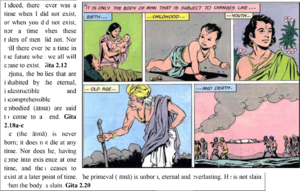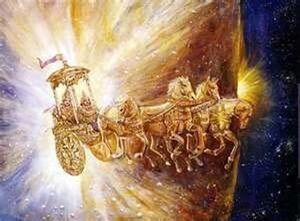Talk:Death belongs to the Physical Body, the Ātmā is Eternal
By Vishal Agarwal
In reality, what we call death is only the perishing of the physical body. The eternal ātmā that makes the body alive never dies and is never born. Krishna teaches,
Numerous stories are narrated to illustrate the truth that death is spoken of only concerning the physical body and that the real ‘I’, which is our ātmā, is everlasting, unborn, and unchanged.
Story: The Children of Somadatta and Kañchanamālā-
During the time of Krishna in the city of Dwārakā lived a couple named Somadatta and Kanchanamālā. They had eight stillborn children one after the other and were very grieved that they were still childless. Therefore, Somadatta performed a Vedic religious ceremony to ward off all evil in the hope that his and Kanchana’s next child would be born alive. But alas, the ninth child too was born dead.
The couple now decided to approach their ruler Krishna for help. They appealed to him, “We are really unfortunate that all our children are born dead. We even performed Vedic ceremonies in the hope that our next child would be born alive, but that did not help us either. Now our only hope is that as our King, you will suggest a solution by which we can become proud parents of a lovely child. You saved the child of Abhimanyu and Uttarā. Please save our next child too. Do not let him suffer by dying prematurely.”
Krishna replied, “What makes you think that your child suffered? It is you both who are suffering, and this is all because of your previous bad karm.” Somadatta replied, “Now that was very insensitive of you to have said that. You are Bhagavān and you have the power to cancel bad Karm. Therefore, I want you to cancel our bad karm so that we can become parents.” But Krishna refused saying, “Your bad karm can be replaced only with good karm done by you both, or if a saint intercedes on your behalf.”
Somadatta left Krishna’s palace with his wife, hurling abuses at Krishna. When Arjuna overheard Somadatta abusing Krishna, he said to Somadatta, “It was wrong on your part to have cursed Krishna. He is always fair and just. If I promise to save your next child from death, will you apologize to Krishna?”
The couple agreed and apologized to Krishna for their misbehavior. When the couple was expecting their tenth child to be born and the wife went into labor, Arjuna stood guard at the door of their house, so that he could prevent Yamadoota (the messenger of Yama, Lord of Death) from entering it. But alas, soon after the birth of the child, Somadatta came out furious. He accused Arjuna, “Thanks to you, our child simply disappeared right after his birth. At least in the past, we could see the face of our baby. Is this how you had promised to help us?”
Arjuna felt very humiliated. He said, “As I have not been able to keep my vow, I will commit suicide.” Arjuna then lit a pyre and was about to enter it when Krishna suddenly appeared and said, “Do not take this rash decision Arjuna. I know that all the ten children are in Vaikuntha, the abode of Vishnu. Let me take you and Somadatta there.” They all alighted Krishna’s chariot and proceeded towards Vaikuntha.
When they reached the Divine Abode, Somadatta was thrilled to see that all of his ten children were playing at the feet of Vishnu and Lakshmi. Krishna said to him, “You have permission to take back your children with you.”
But as Somadatta went ahead and picked up the youngest child. But surprisingly, the child shrieked in pain and said, “Put me down, I do not want to leave my parents.” Somadatta said, “But I am your real father. I have come to take all of you back to Dwārakā where your mother is waiting for you.” The kids started running away from Somadatta. One of them said, “We might be little kids, but we surely know who our real parents are. They are Vishnu and Lakshmi, and they are our parents in all our lives.”
Somadatta was greatly disappointed and saddened. He said to Krishna, “It appears that these children are wiser than I am. And they are happier here than they will ever be with me and Kanchanamāla. But I wish that they would come with me so that I could feel the joy of raising them. I now understand that Bhagavān entrusts the care of his children to earthly parents for a while, and we should not start believing that we are their eternal parents.”
Krishna smiled with a look of compassion, and he played his divine flute. The music drew the children towards Krishna. Then, Krishna touched their foreheads with his loving hands. Immediately, the children looked at Somadatta and hugged him, calling him ‘Father’ lovingly.
Somadatta took the kids to his wife Kanchana, who was overjoyed to see them. She cried with joy. Both the parents fell at Krishna’s feet and asked him for His continued blessings. But before Krishna left, Somadatta could not help asking, “Why did the touch of your hand transform these kids? Why did they forsake Vishnu and Lakshmi and agree to come with me to the earth?”
Krishna answered, “That was my touch of Māyā – the magical power of this physical world. All humans are under the spell of Māyā, which is why they forget their real Parent who is Bhagavān Himself. They forget that real joy is in being close to Bhagavān. But under Māyā’s spell, humans regard their earthly relationships as more important than their relationship with the Divine and are attracted towards material pleasures instead of the eternal and infinite joy of being with Bhagavān.”


